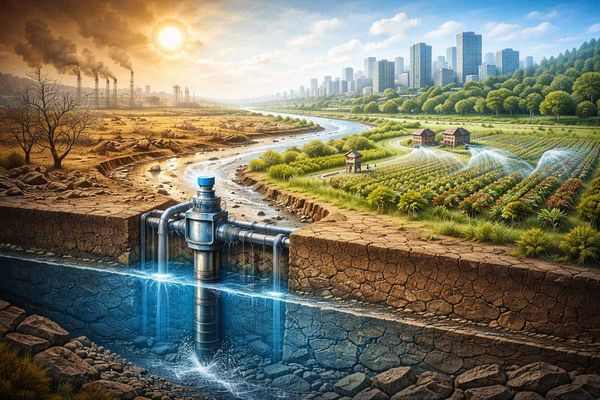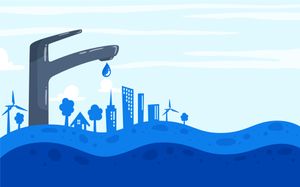What is Non-Revenue Water (NRW)? Causes, Impact & Reduction Strategies
Non-Revenue Water (NRW) refers to the water lost in the distribution system before it reaches the end user, i.e. it is supplied but not billed, representing a loss to the water utility. It's estimated that around 38% of India's water supply is lost due to NRW. This water is not used or paid for, impacting water utilities and putting pressure on water resources. Some cities in India, like Kolkata and Bangalore, have NRW levels of up to 50%.
- Real losses: These are physical losses in the system, such as leaks in pipes, bursts, or overflows in the transmission system or water storage tanks of the utility.
- Apparent losses: These are losses that occur after the water is delivered to the consumer but are not metered or billed correctly. Metering inaccuracies and water theft causes apparent losses, and the water used becomes non-revenue water.
- Unbilled authorized consumption: This includes water used for public services like firefighting or street cleaning, which may be free of charge.
NRW causes reduced revenue for the water utility companies, leading to higher water rates or reduced investment in infrastructure. Leakages and other losses cause significant water loss in a water-strapped world, as India is expected to have only half its required water available by 2030. Losing half of it as non-revenue water poses significant threat to communities.
Reducing NRW
- Leak detection and repair: Identifying and fixing leaks in the distribution system is a key step in reducing NRW.
- Improved metering and billing: Accurate metering and billing systems can help track water usage and identify potential losses.
- Maintenance and updating water infrastructure: Outdated pipes and tanks in the water distribution network need to be updated for an efficient and loss-free network.
- Addressing Water Theft: Addressing unauthorized water use can help reduce apparent losses.
- Conservation: Start at home: Simple changes can go a long way. Switch off that tap while you brush, take shorter showers, reuse water wherever possible. Monitor your water usage. Fix the leaking pipes in time. Make water conservation a habit.
Some Indian cities have started addressing NRW, recognising its significance in mitigating water scarcity. Jamshedpur has made significant strides in reducing non-revenue water (NRW), with reports indicating a reduction from 51% to 21%. This reduction was achieved through the implementation of a District Metering Area (DMA) approach and the use of an NRW cell to identify and repair leaks.



